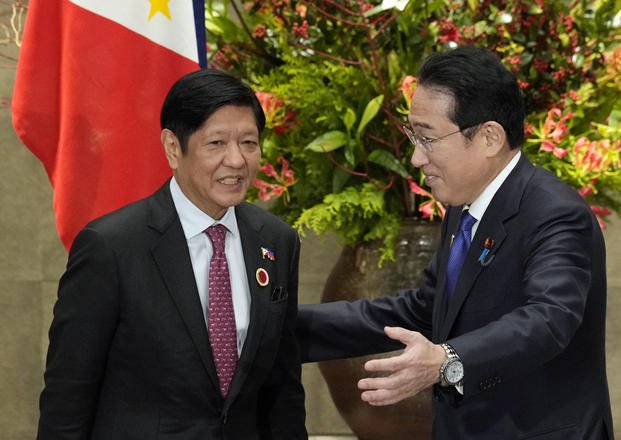MANILA, Philippines — Top defense and foreign affairs officials of Japan and the Philippines will meet in Manila next month to strengthen strategic ties and discuss regional concerns, the Philippine Department of Foreign Affairs said Friday at a time of escalating concerns over China’s actions in the disputed South China Sea.
Details of the agenda of the July 8 meetings of Japanese Foreign Minister Kamikawa Yoko and Defense Minister Kihara Minoru with their Philippine counterparts were not immediately made public, but two officials of both countries told The Associated Press that efforts were underway to finalize a key defense pact which they hope could be signed during the meetings.
The officials spoke on condition of anonymity because of a lack of authority to discuss the issue publicly.
During a visit to Manila last year, Japanese Prime Minister Fumio Kishida agreed with Philippine President Ferdinand Marcos to start negotiations on a reciprocal access agreement which would allow troops to enter each other’s territory for joint military exercises and strengthened defense cooperation. The move is part of efforts to strengthen their alliance in the face of what they regard as China’s growing assertiveness in the region.
Marcos said last year that the proposed defense pact would be beneficial “both to our defense and military personnel and to maintaining peace and stability in our region.” Kishida announced during the Manila visit that a coastal surveillance radar would be given to the Philippines through a grant, making it the first Southeast Asian nation to become a beneficiary of a newly launched Japanese security assistance program for allied militaries in the region.
Additional Japanese patrol vessels, defense equipment and radars will be provided to strengthen the Philippines’ law enforcement capability at sea, Kishida said last year. Japan has supplied a dozen patrol ships in recent years to the Philippines, which is now largely using them to defend its territorial interests in the contested waters.
Japan has had a longstanding territorial dispute with China over islands in the East China Sea. Meanwhile, Chinese and Philippine coast guard and navy ships have been involved in a series of tense confrontations in the South China Sea, a key global trade route.
In the worst confrontation so far, Chinese coast guard personnel armed with knives, spears and an axe aboard motorboats repeatedly rammed and destroyed two Philippine navy supply vessels at disputed Second Thomas Shoal last week, injuring several Filipino sailors. Chinese sailors seized at least seven Philippine navy rifles.
The Philippines strongly protested the Chinese coast guard’s actions and demanded payment for the damage and the return of the rifles. China accused the Philippines of instigating the violence, saying the Filipino sailors strayed into what it called Chinese territorial waters despite warnings, prompting its coast guard to take action.
Japan, along with the United States and its Asian and Western allied countries and security partners, expressed concern over the Chinese actions.
“Japan reiterates serious concern over repeated actions which obstruct freedom of navigation and increase regional tensions, including recent dangerous actions that resulted in damage to the Filipino vessel and injuries to Filipinos onboard,” the Ministry of Foreign Affairs in Tokyo said after the confrontation.
Washington renewed its warning that it is obligated to defend the Philippines, its oldest treaty ally in Asia, if Filipino forces, ships and aircraft come under an armed attack, including in the South China Sea.
Marcos and other Philippine officials said the Chinese assault on the Filipino navy personnel last week, which was caught on video and photographs that were made public by the Manila government, was “illegal” and “deliberate,” but did not amount to an armed assault that would activate the 1951 Mutual Defense Treaty with the U.S.
Story Continues
© Copyright 2024 Associated Press. All rights reserved. This material may not be published, broadcast, rewritten or redistributed.
Read the full article here


